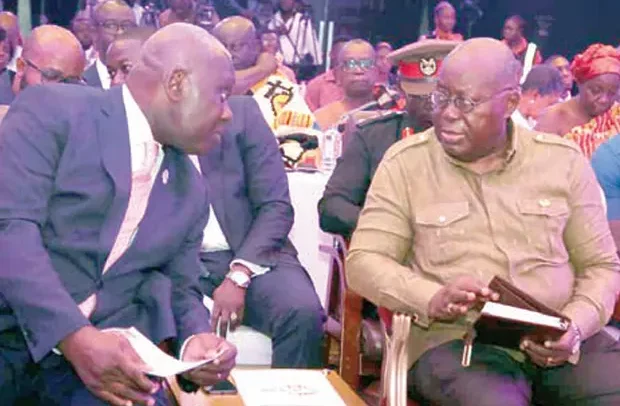President Akufo-Addo (R), interacting with Dr. Eugene Owusu. Pix by Gifty Lawson.
President Akufo-Addo wants his fellow African leaders to invest more in the development of the continent’s youth.
He believes it is one of the key interventions to turn around the fortunes of the continent.
That, he said, would also help achieve the United Nations (UN) Sustainable Development Goals (SDGs).
With its unique position and 60 per cent of Africa’s population under the age of 25, he stressed the need to strategically invest in the youth in order to prepare them for a takeover of the continent’s future.
He made the call when he opened the 2024 SDG Action Summit in Accra yesterday.
The two-day summit, which is being organised under the auspices of President Akufo-Addo in his capacity as the co-chair of the Emeritus Group of SDG Advocates, is on the theme, “From mid-point to success – Recommitting, scaling up and accelerating action on the SDGs.”
It is being attended by eminent personalities including thought leaders, civil societies, politicians, technocrats, diplomats and political leaders from across the world.
Outlining his four point agenda to accelerate the implementation of the SDGs, President Akufo-Addo said there was an urgent need for the continent to scale-up actions to meet the 2030 targets.
To this end, he said prioritising human capital development was non-negotiable, stressing that there was the need to increase access to quality education with overarching emphasis or focus on Science, Technology, Engineering, and Mathematics (STEM) education while promoting the arts and humanities to boost critical thinking, creativity, and leadership skills.
Touching on other areas of his four-point agenda, he said in addition to prioritising human capital development, there was the need to focus on unlocking financing for accelerated SDGs implementation.
He said that while Africa remained committed to the SDGs, the present financing gap made it difficult to achieve the goals.
President Akufo-Addo explained that the United Nations Economic Commission for Africa (UNECA) estimated that Africa required an additional $1.3 trillion annually to achieve the SDGs by 2030.
He, therefore, called for enhanced domestic resource mobilisation through improved tax collection systems, combating illicit financial flows, and promoting transparency in public financial management.
President Akufo-Addo said curbing illicit financial flows, which cost Africa an estimated $90 billion annually alone, would enable the continent retain valuable resources within her economies.
In addition to this, he emphasised the role of public-private partnerships (PPPs) in bridging the financing gap and called for the creation of an enabling environment through smart policies to attract private capital for critical infrastructure projects in the area of healthcare, education, and renewable energy initiatives.
He also highlighted the importance of leveraging blended finance approaches to attract private capital to areas yielding both developmental and financial returns.
The President said there was the need for a paradigm shift in the global financial architecture, adding that “There is the need for a comprehensive debt relief for heavily indebted countries to restore fiscal stability and free up resources for sustainable development investments.”
The President also touched on the potential of financial integration across borders and renewable energy technologies to scale up and accelerate SDGs action.
He said the continent must leverage its abundant natural resources for renewable energy technologies, citing Rwanda’s off-grid solar initiatives and Morocco’s Noor Ouarzazate Solar Complex as examples of Africa’s leadership in renewable energy innovation.
He said there was the need to build resilient infrastructure to withstand global shocks, stressing that “The vulnerabilities exposed by the COVID-19 pandemic and geopolitical tensions, called for the development of reliable infrastructure to support diverse economic activities.”
He also stressed the importance of providing smart insurance schemes for financial protection to vulnerable communities and businesses.
“Together, we can build a sustainable and prosperous Africa that leaves no one behind,” he asserted, calling for collective efforts to achieve the transformative change needed to meet the SDGs by 2030.
On her part, Assistant Secretary-General and Director, Regional Service Centre for Africa, United Nations Development Programme (UNDP), Ahunna Eziakonwa, called for the continent to scale-up its efforts at achieving the SDGs.
She said with barely seven years to the end of the targets, only 15 per cent of the goals had been reached by most countries, with some as low as 12 per cent.
Ms. Eziakonwa said the situation made it imperative for all stakeholders to put in the needed efforts towards the attainment of the goals.
Special Advisor to the President on SDGs, Dr. Eugene Owusu, called on global leaders to double down on their efforts towards the attainment of the SDGs by 2030.
He said this had become necessary because despite the SDGs going past its midpoint of the time frame for implementation, not much had been achieved.
“At the midpoint of the SDGs implementation, our calculations are that less than four per cent of the SDG targets were on track to be achieved by 2030 by Africa,” he said.
Dr. Owusu explained that the UN summit would aim at turbocharging actions on the SDGs as well as build a consensus on delivering a better today whilst safeguarding the future.
He explained that the overarching objective of the summit was to reignite renewed commitment to the implementation of the SDGs, and catalyse bold and innovative actions necessary to put the SDGs on track across the continent.
Dr. Owusu noted that the urgency of action on the SDGs could not be overstated, stressing that “we are at a critical juncture where accelerated efforts are necessary to give us a reasonable chance of meeting the 2030 targets.”
By Charles Takyi-Boadu, Presidential Correspondent


